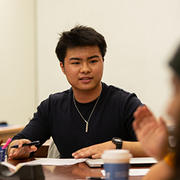
Food deserts are commonly perceived as an issue far from home, but in reality, they may be closer than one thinks. This was the core message of a high school lesson plan focusing on food deserts, designed by Taisuke Sato, a senior at the Cambridge School of Weston (CSW) and a 2019 Spring Intern at the Incubator. Taisuke first visited the Incubator in 2016, as part of an integrated global studies course collaboration between CSW and GHELI.
Building on this foundation, Sato leveraged the Incubator’s digital repository as a starting place for his chosen topic—how food corporations impact local communities. “I’ve been very interested in how the private sector has shaped what people eat and drink,” shared Sato. As he continued his research, Sato was drawn to understanding the multiple dimensions of food access in the Greater Boston region.
Under the mentorship of Nina Bhattacharya, the Incubator’s Instructional Design Specialist, Taisuke pieced together research and data that painted a picture of food access challenges and opportunities. Eager to spread his learning with his peers and community members, Sato designed a lesson that brought to life the data he was seeing. With the support of his instructors at CSW, he had the special opportunity to teach one class period.
To make this unique opportunity a success, Taisuke brought his lesson plan to the Incubator’s Learning Lab following a semester of designing and iterating activities. During Learning Lab, he walked through his 90-minute lesson plan before opening the session to staff, who bounced around suggestions drawn from their own experiences in learning and pedagogy.
“Presenting to the Learning Lab was a once-in-a-lifetime opportunity,” said Sato. “It was so helpful to get feedback from the Incubator’s staff and pedagogy experts so that I could refine the lesson before testing it out in the actual classroom.”
His lesson plan highlighted the social determinants which contribute to the lack of food accessibility and nutrition in Mattapan, a neighborhood of Boston, Massachusetts. One of the vital components to Sato’s lesson plan was a mapping activity in which students had the opportunity to visualize the food accessibility disparities in this neighborhood.
During this class period, students gathered around a printed map of Mattapan and put colored push pins in areas that had supermarkets, fast food restaurants, and corner stores. Seeing gaps in areas in the map not only allowed students to visualize which kinds of food sources are easily (or not so easily) available, but also caused them to think critically about what kinds of choices they would make if they were residents in this Mattapan area. Additionally, students discussed the structural barriers and social determinants that make executing public health policies and decisions more difficult.
Sato hopes that this activity will encourage students to discuss larger implications and effects of the food industry and food deserts on the populations of local communities not only in the Greater Boston area, but throughout the United States and the world. He also hopes that students will take what they learn from this activity and apply it to their final school projects, where they must take an issue in their communities and do field work to help realize actionable solutions.
“It was remarkable to watch Taisuke nurture this seed of an idea into a lesson plan that was both engaging and grounded in evidence,” shared Bhattacharya, his staff mentor. “Taisuke was so open to receiving feedback and testing out different activities—and this iterative process is reflected in the final lesson he led at CSW.”
After his high school graduation, Taisuke plans to spend the summer at home in Japan before returning to start his freshman year at Tufts University. At Tufts, he plans to major in Biopsychology and minor in Education, the latter in part inspired by his internship at the Incubator.
Best of luck, Taisuke!
